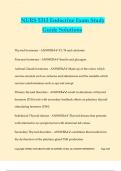NURS 5315 Endocrine Exam Study
Guide Solutions
Thyroid hormones - ANSWER✔✔-T3, T4 and calcitonin
Pancreas hormones - ANSWER✔✔-Insulin and glucagon
Adrenal Glands hormones - ANSWER✔✔-Made up of the cortex which
secretes steroids such as cortisone and aldosterone and the medulla which
secretes catecholamines such as epi and norepi
Primary thyroid disorders - ANSWER✔✔-result in alterations of thyroid
hormone (TH) levels with secondary feedback effects on pituitary thyroid
stimulating hormone (TSH)
Subclinical Thyroid disease - ANSWER✔✔-Thyroid disease that presents
with minimal to no symptoms but with abnormal lab values
Secondary Thyroid disorders - ANSWER✔✔-conditions that results from
the dysfunction of the pituitary gland TSH production
Copyright ©EMILLYCHARLOTE 2025 ACADEMIC YEAR, ALL RIGHTS RESERVED. Page 1/18
,Thyrotoxicosis - ANSWER✔✔-(hyperthyroidism) a condition that results
from any cause of increased TH levels. Will how low TSH levels and high
T4 level. S&S: increased metabolic rate, heat intolerance, goiter, menstrual
irrregularities, weight loss, diaphoresis, fine tremor, tachycardia, frequent
bowel movements, restlessness, short attention span, hair loss, anorexia,
exophthalmos, pretibial edema, and heart failure.
Thyrotoxic Crisis(thyroid storm) - ANSWER✔✔-worsening hyperthyroid
state triggered by an igniting even such as infection, trauma,
cardiopulmonary disorder, burns, seizures surgery, or spontaneously. S&S:
extreme restlessness and agitation, delirium, seizures, coma, severe
tachycardia, heart failure, hyperthermia, delirium, volume depletion, NVD
and death if not treated.
Grave's disease - ANSWER✔✔-Most common cause of hyperthyroidism
and is an autoimmune disorder. Antibodies attach to the thyroid cells and
mimic the function of TSH which results in an increased secretion of T3
and T4 and overrides the negative feedback mechanisms which regulate
TSH secretion. The stimulation of the receptors by the antibodies results in
the development of goiter. May also experience exophthalmos, periorbital
Copyright ©EMILLYCHARLOTE 2025 ACADEMIC YEAR, ALL RIGHTS RESERVED. Page 2/18
, edema, and extraocular muscle weakness leading to strabismus and
diplopia
Hyperthyroidism from nodular thyroid disease - ANSWER✔✔-Follicular
hypertrophy of the thyroid cells is responsible for the formation of the
thyroid nodules which secrete extra hormones. Nodules develop bc of
normal changes during pregnancy or puberty or as a result of an
autoimmune issue, viral infection or genetic influence. Symptoms develop
slowly and will not display exophthalmos or pretibial myxedema
Primary hypothyroidism - ANSWER✔✔-Defect is in the thyroid gland
itself which causes insufficient amounts of thyroid hormone. Causes
include congenital defects, thyroidectomy, thyroid radiation, iodine
deficiency, anti-thyroid medications, or impairment in thyroid hormone
synthesis
Secondary hypothyroidism - ANSWER✔✔-Malfunction in the pituitary or
hypothalamus glands which leads to a lack of TSH. Most common cause is
pituitary tumors. Other causes include TBI, subarachnoid hemorrhage, or
pituitary infarction
Copyright ©EMILLYCHARLOTE 2025 ACADEMIC YEAR, ALL RIGHTS RESERVED. Page 3/18




